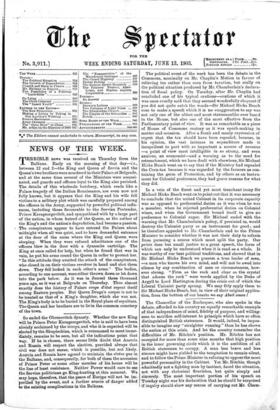The political event of the week has been the debate
in the Commons, nominally on Mr. Chaplin's Motion in favour of relieving tea rather than corn from taxation, but really on the political situation produced by Mr. Chamberlain's declara- tion of fiscal policy. On Tuesday, after Mr. Chaplin had concluded one of his typical orations—orations of which it was once cruelly said that they seemed wonderfully eloquent if you did not quite catch the words—Sir Michael Hicks Beach rose to make a speech which it is no exaggeration to say was not only one of the ablest and most statesmanlike ever beard in the House, but also one of the most effective from the Parliamentary point of view. It was as remarkable as a piece of House of Commons oratory as it was epoch-making in matter and occasion. After a frank and manly expression of regret that the tax should have been repealed, because, in his opinion, the vast increase in expenditure made it inexpedient to part with so important a source of revenue —a point of view most intelligible in so strong, and even anxious, an economist—and a warning as to the need for retrenchment, which we have dealt with elsewhere, Sir Michael Hicks Beach went on to say that if the Ministry had repealed the Corn-tax because it was regarded by the farmers as con- taining the germ of Protection, and by others as an instru- ment for Colonial preference, they had grave reasons for what they did.










































